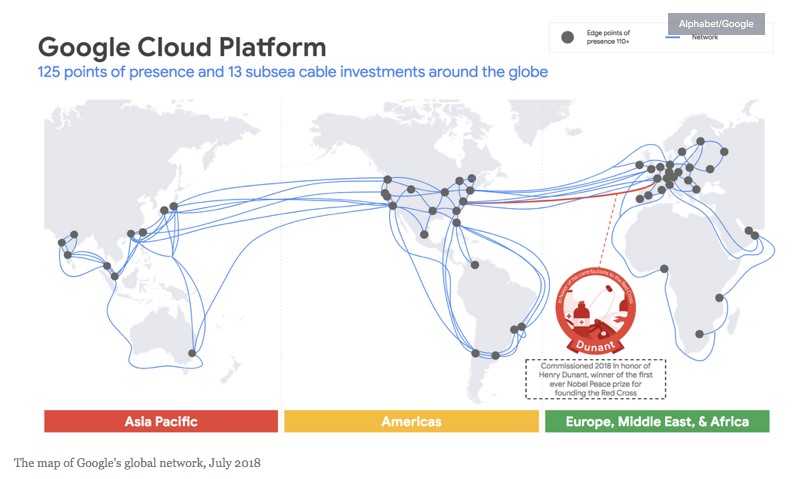Google is trying to make history again, this time with a massive subsea cable project that would be the first one traversing the Atlantic and not solely owned by a telecommunications company.
Google has announced it is building a private, 4,000-mile subsea cable running from Virginia to France to connect a U.S. data center directly to Europe.
It’s all about expanding the Google Cloud at a time when the company says web traffic across the Atlantic is booming.
Dubbed the “Dunant Cable”—after the world’s first Nobel Prize recipient, Henri Dunant, founder of the Red Cross—Google’s cable will be built in cooperation with TE SubCom, and should be fully operational by 2020, with a projected lifespan of 15 to 25 years.
The new cable adds to Google’s already impressive subsea portfolio.
In the past decade, Google has invested in 13 subsea cables to build out its cloud computing infrastructure, eight of which are expected to go online in the next 18 moths.
What’s different this time around? This is a private investment by Google, and only its second in the cable segment. The first was its 100-percent private investment in a cable connecting LA with Chile, which is slated to become operational in 2019.
This time around, Google isn’t keen on sharing its bandwidth—a downfall of building a cable in a consortium deal, as it did with the U.S.-to-Denmark Havfrue cable and the Ireland-to-Hong Kong-Guam cable.
Though such projects typically cost hundreds of millions of dollars, owning its own cable will allow Google to directly connect its data centers without having to share any of the bandwidth, according to a blog post by Google’s Jayne Stowell.
“When we build privately, we can choose this route based on what will provide the lowest latency for the largest segment of customers,” Stowell noted. Related: Wall Street Expert Predicts Citi Shares Will Double By 2020
This time around, Google won’t have to compromise. And that may end up being its advantage over rivals like Microsoft and Amazon, who are both relying on consortium deals for cables that transfer data across the Atlantic.
For instance, this isn’t the first cable to be laid from Virginia. Last year, a consortium of Microsoft, Facebook and telco Telxius laid one from here to Bilboa, Spain in the Marea project.
Likewise, Japanese Softbank, Facebook and Amazon jointly funded the massive, 8,700-mile Jupiter cable system connecting the U.S. to Asia and slated to come online in a couple of years.
But they all have to share, and Google won’t.
Google’s cloud business is massive:

(Click to enlarge)
And adding another major cable to its portfolio—all on its own—is trouncing the telecoms industry. Google seems to hope this is this stuff of legend—or at least grounds for bragging rights.
Google’s Treynor Sloss has suggested as much with the U.S.-Chile “Curie” cable.
“In 2008, we were the first tech company to invest in a subsea cable as a part of a consortium. With Curie, we become the first major non-telecom company to build a private intercontinental cable,” Treynor wrote in a blog post.
By Damir Kaletovic for Safehaven.com
More Top Reads From Safehaven.com
















